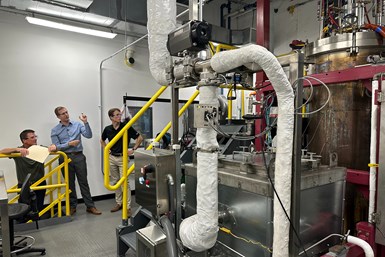A Green Stream of Critical Materials
6K Energy has created a sustainable process to produce new battery components, leveraging both domestic and recycled feedstock.
Travis (far left) and Max Egan (far right) stand next to a plasma column that synthesizes EV battery materials at the 6K Battery Center of Excellence.
For the grand finale of the IMTS+ original series “Manufacturing Explorers,” brought to you by Mazak, my son Max and I explore what might be the key to EV growth — the synthesis of lithium-ion cathode battery materials via a sustainable process in domestic facilities.
Recycling steel, aluminum and other materials from junked cars is a long-established business. In fact, almost 69% of all steel is recycled in North America each year, according to the National Material Company. Because of their batteries, EVs require a new recycling supply chain. The good news is that battery elements don’t burn up their usefulness like hydrocarbon fuels. After an EV battery has exceeded its life (generally about a decade), the elements can be reclaimed. The better news is that a company called 6K Energy has created a sustainable process to produce new battery components, leveraging both domestic and recycled feedstock.
Max and I visited this pioneering company’s Battery Center of Excellence in North Andover, Massachusetts, a Boston suburb. 6K created the UniMelt system, a production-scale microwave plasma process that produces critical materials. In this episode, we dive deep into the process, learning how 6K creates plasma gas for advanced material production. Then we get a close look at 6K’s production-scale system, which stands two stories tall. The UniMelt process injects feedstock and gases at the top of a stainless-steel vessel; the feedstock flows through the precisely controlled, ultrahigh-temperature 6,000°F plasma gas; and high-value materials come out at the bottom of the vessel.
The UniMelt process takes just two seconds. In comparison, other processes take hours or days, require a large footprint and consume large amounts of water and energy.
6K also has its own materials testing facilities on-site. To validate the energy capacity of materials produced by the UniMelt system, Max gets to build a “coin cell” (CR-type) battery used to power portable electronic devices. As an interesting note, I was excited to learn that 6K also uses the UniMelt process to produce spherical metal powders and alloys for 3D printing.
In addition to a technical tour, we get to meet with Rob Davis, 6K Energy’s chief operating officer, and Mary Cronin, 6K’s senior vice president of government affairs. Davis reveals the company’s plans to build a full-scale production facility in Jackson, Tennessee. The plant will be 160,000 square feet and produce about 12 ½ tons of cathode material, which is enough for about 100,000 cars. Cronin notes that because UniMelt enables a sustainable, diverse, reliable and domestic supply chain for EV battery components, 6K Energy received funding from the Bipartisan Infrastructure Law.
In three seasons of “Manufacturing Explorers,” we have traveled from coast to coast and into the heartland. The series started with exploring the core manufacturing technologies and facilities where I spent 25 years of my life, then our show pivoted to sustainable technologies that interest Max. Throughout each episode, we’ve hoped to engage audiences. On a personal note, the IMTS family wishes Max the best of luck as he pursues his dream career as a renewable energy industry consultant. After watching this episode at IMTS.com/ME6K, go back and see how it all started at
IMTS.com/ManufacturingExplorers.
Read Next
3D Printed Polymer EOAT Increases Safety of Cobots
Contract manufacturer Anubis 3D applies polymer 3D printing processes to manufacture cobot tooling that is lightweight, smooth and safer for human interaction.
Read MorePostprocessing Steps and Costs for Metal 3D Printing
When your metal part is done 3D printing, you just pull it out of the machine and start using it, right? Not exactly.
Read MoreAlquist 3D Looks Toward a Carbon-Sequestering Future with 3D Printed Infrastructure
The Colorado startup aims to reduce the carbon footprint of new buildings, homes and city infrastructure with robotic 3D printing and a specialized geopolymer material.
Read More
















